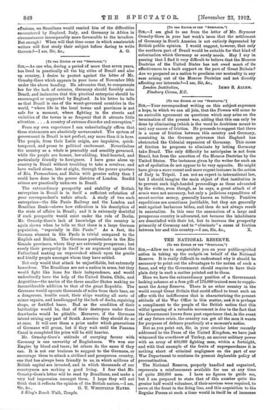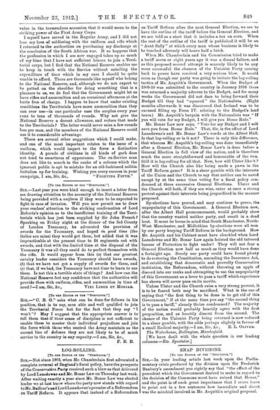THE NATIONAL RESERVE.
[To TIER EDITOR or TER " SPECTATOR:1
Sra,—Allow me to congratulate you on your public-spirited action in taking up the cudgels on behalf of the National Reserve. It is really difficult to understand why it should be necessary to point out the advantages to the nation of such a force, and why the Government should require to have their plain duty in such a matter pointed out to them.
Here we have the extraordinary position of a Government looking askance at a free gift of 170,000 trained men to supple- ment the Army Reserve. There is no other country in the world except Great Britain that could afford to treat such an offer with the indifference that is characterizing the present attitude of the War Office in this matter, and it is perhaps a compliment to the people of the British nation that this wilful ignoring of a valuable movement is due to the fact that the Government knows from past experience that, in the event of any future crisis, the country can get all the men it wants for purposes of defence practically at a moment's notice.
But as you point out, Sir, in your circular letter recently addressed to the Press of the United Kingdom, we have just witnessed the overthrow of Turkey, an ancient military power with an army of 400,000 fighting men, within a fortnight, and with that example of the fruits of unpreparedness it is nothing short of criminal negligence on the part of our War Department to continue its present deplorable policy of procrastination.
The National Reserve, properly handled and organized, represents a reinforcement available for use at any time of quite 200,000 men. I have no figures to guide me, but I am prepared to state that of this number quite the greater half would volunteer, if their services were required, to serve at the front in the firing line, and this acquisition to the Regular Forces at such a time would in itself be of immense
value in the tremendous accession that it would mean to the striking power of the First Army Corps.
I myself have served in the Regular Army, and I did not lose my love of soldiering with the uniform and rifle which I returned to the authorities on purchasing my discharge at the conclusion of the South African war. It so happens that the profession in which I am now engaged takes up so much of my time that I have not sufficient leisure to join a Terri- torial corps, but I find that the National Reserve enables me to keep in touch with the Service without entailing the expenditure of time which in my case I should be quite unable to afford. There are thousands like myself who belong to the National Reserve, and, although we do not expect to be patted on the shoulder for doing something that is a pleasure to us, we do feel that the Government might let us have rifles and ammunition and an occasional afternoon at the butts free of charge. I happen to know that under existing conditions the Territorials have more ammunition than they can ever use—in one particular case the surplus every year runs to tens of thousands of rounds. Why not give the National Reserve a decent allowance, and reduce that made to the Territorials ? The latter would never miss a few rounds less per man, and the members of the National Reserve could use it to considerable advantage.
There are several other suggestions which I could make, and one of the most important relates to the issue of a uniform, which would impart to the force a distinctive identity. A parade of civilians in all kinds of garb does not tend to smartness of appearance. The ex-Service man does not like to march in the ranks of a column which the ignorant public is apt to mistake for an old-fashioned militia battalion up for training. Wishing you every success in your















































 Previous page
Previous page